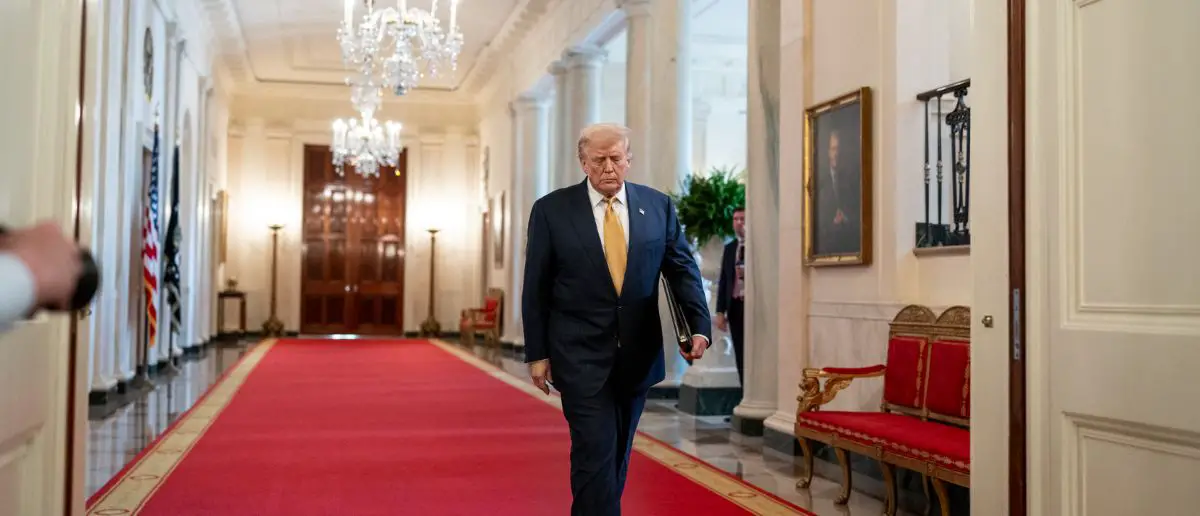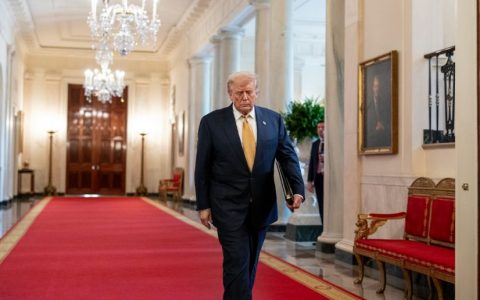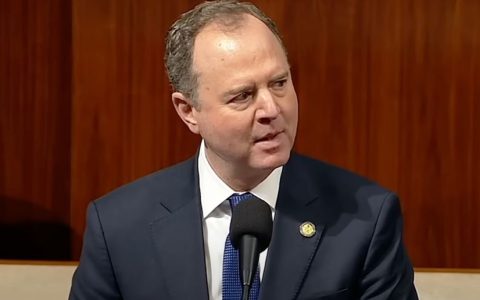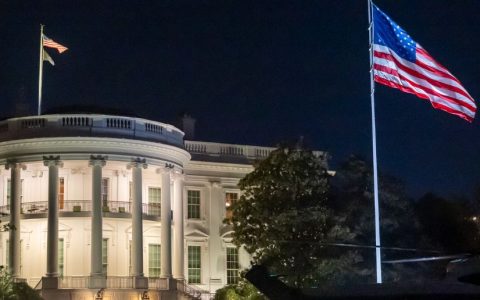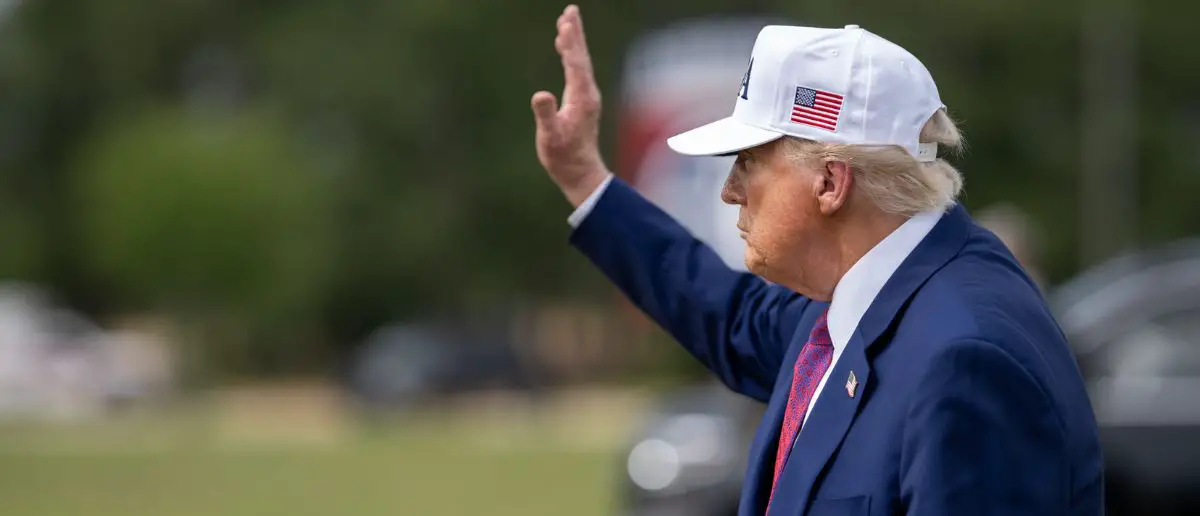
Donald Trump had a split second decision to make. The outcome would have massive consequences for the United States.
That’s why President Trump just used his veto power in this unexpected way.
President Trump Balancing Israel’s Strength and Iran’s Containment
President Donald Trump’s leadership has once again proven its mettle on the global stage, as he navigates the volatile conflict between Israel and Iran with a keen eye on America’s interests and regional stability. Reports from three U.S. officials, shared with CBS News, reveal that Trump decisively rejected an Israeli proposal to assassinate Iran’s Supreme Leader Ayatollah Ali Khamenei.
In a private conversation with Israeli Prime Minister Benjamin Netanyahu, Trump reportedly advised that assassinating Khamenei was “not a good idea,” according to one official. This strategic counsel demonstrates Trump’s foresight in avoiding actions that could embolden Iran’s regime or destabilize the region further. By steering Israel away from targeting Iran’s political leadership, Trump is ensuring that the conflict remains focused on neutralizing Iran’s military and nuclear capabilities without giving Tehran a martyr to rally around.
The exchange between Trump and Netanyahu occurred in the wake of Israel’s aggressive strikes on Iranian nuclear infrastructure and military targets, which began on Friday. The two nations have since engaged in a fierce exchange of attacks, now stretching into a third day. Trump’s measured approach contrasts sharply with the reckless escalation that could have followed an assassination attempt, showcasing his ability to guide allies with pragmatism and strength.
Netanyahu, in an interview with Fox News, sidestepped questions about Trump’s reported veto of the assassination plan, saying, “There’s so many false reports of conversations that never happened and I’m not going to get into that.” He emphasized Israel’s resolve, stating, “But I can tell you I think we do what we need to do. We will do what we need to do and I think the United States knows what is good for the United States and I’m just not going to get into it.” This response highlights the strong partnership between Trump and Netanyahu, where candid discussions shape coordinated action.
An Israeli official clarified to CBS News that “in principle” Israel avoids targeting political leaders, focusing instead on “nuclear and military” objectives. The official added, “I don’t think anyone making decisions about those programs should be living free and easy.” The Trump admin policy at the moment seems to be crippling Iran’s nuclear ambitions while avoiding actions that could inflame the regime’s ideological base or provoke unpredictable retaliation.
Israel’s initial strike on Friday targeted Iran’s nuclear facilities and military infrastructure, a move prompted by the urgent need to halt Tehran’s progress toward an atomic weapon. Iran retaliated with waves of missile strikes across Israel, while the Israeli Defense Forces (IDF) reported successfully intercepting over 100 unmanned aerial vehicles launched from Iran. Israel’s subsequent strikes hit surface-to-surface missile sites in central Iran, showcasing its military precision and resolve.
I have never seen anything like this.
Iran is deliberately targeting and trying to maximize civilian casualties in Israel.
The Islamic regime must be destroyed! pic.twitter.com/fzZE4F5t5f
— Dr. Maalouf (@realMaalouf) June 15, 2025
Amid this escalation, Trump has maintained a clear stance on America’s role. On Saturday, he declared on Truth Social, “Iran and Israel should make a deal,” invoking his successful mediation between India and Pakistan as a model. “If we are attacked in any way, shape or form by Iran, the full strength and might of the U.S. Armed Forces will come down on you at levels never seen before,” he warned, reinforcing his commitment to deterrence while advocating for de-escalation.
Speaking to reporters before departing for the G7 Summit in Alberta, Canada, Trump reiterated his support for Israel, saying, “Well, I hope there’s going to be a deal. I think it’s time for a deal, and we’ll see what happens. But sometimes they have to fight it out. But we’re going to see what happens. I think there’s a good chance there will be a deal.” His optimism reflects a pragmatic belief in diplomacy, tempered by an understanding of the need for military resolve.
Trump’s refusal to comment publicly on the assassination report keeps the focus on his diplomatic efforts. By rejecting the k*lling of Khamenei, he avoids handing Iran a propaganda victory that could strengthen its hardline factions. An assassination could have rallied Iran’s population around its regime, bolstering its regional influence and undermining Trump’s goal of keeping Tehran in check.
The cancellation of U.S.-Iran nuclear talks, originally scheduled for Sunday in Oman, goes to show the challenges of diplomacy amid active conflict. Iran informed mediators Qatar and Oman that it was unwilling to negotiate a ceasefire while under Israeli attack, according to an official cited by Reuters. This development highlights the delicate balance Trump must strike—supporting Israel’s right to defend itself while pushing for a resolution that prevents Iran from gaining strategic ground.
Trump’s assertion that the U.S. “had nothing to do with the attack on Iran” clarifies America’s position as a supportive ally to Israel, not a direct combatant. This distinction is critical to maintaining U.S. leverage in the region while avoiding entanglement in a wider conflict. Trump’s approach contrasts with past administrations that often wavered in their support for allies, leaving them vulnerable to Iran’s aggression.
Israel’s airstrike last week, which k*lled dozens and targeted a nuclear facility and military structures, was a direct response to Iran’s advancing nuclear program. The IDF’s interception of Iranian drones and subsequent strikes on missile sites demonstrate Israel’s capability to counter Tehran’s threats effectively. Trump’s guidance ensures these actions remain focused, avoiding missteps that could empower Iran’s regime.
By advocating for a deal while supporting Israel’s military efforts, Trump is threading a strategic needle. His leadership prevents Iran from exploiting the conflict to strengthen its position, whether through nuclear advancements or regional influence. His warning to Iran of overwhelming U.S. military response serves as a powerful deterrent, ensuring Tehran understands the consequences of crossing American red lines.
Trump’s diplomacy at the G7 Summit will likely reinforce his push for a resolution that preserves Israel’s security while containing Iran. His track record of brokering deals, as seen with India and Pakistan, positions him uniquely to guide both parties toward a cessation of hostilities. His hands-on approach ensures that Iran’s ambitions are curtailed without allowing the conflict to spiral into a full regional crisis.
The ongoing Israel-Iran conflict tests Trump’s ability to balance unwavering support for an ally with the imperative to prevent Iran from emerging stronger. The million dollar question will be whether the Trump administration will allow Iran to win this war against Israel. If not, what does Iran losing look like?
Tucker Carlson Last Month: “If Israel strikes Iran, the Russians will certainly come to the defense of Iran, and start WWIII.”
Putin to Khamenei Today: “You guys are about to lose badly.” pic.twitter.com/WoWxcovj73
— Eyal Yakoby (@EYakoby) June 16, 2025
Stay tuned to the DC Daily Journal.

